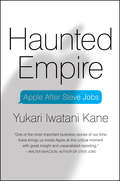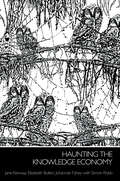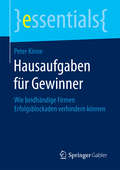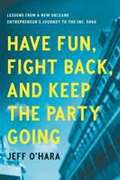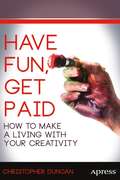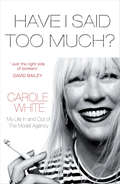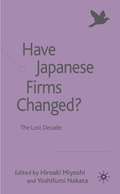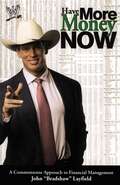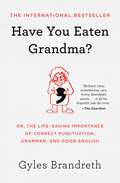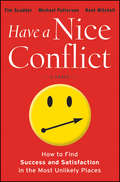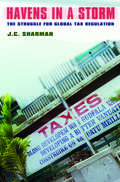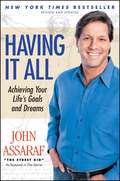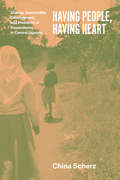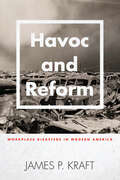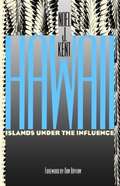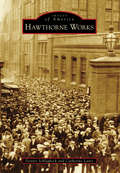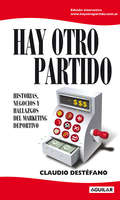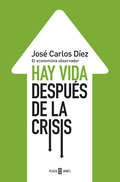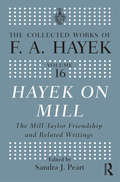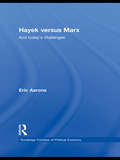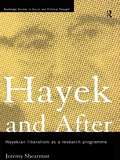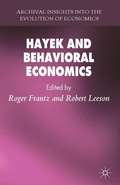- Table View
- List View
Hattori-Seiko and the World Watch Industry in 1980
by Michael E. Porter Edward J. HoffFocuses on the industry's development and evolution in three principal watch producing countries: Switzerland, the United States, and Japan. Based in part on two earlier cases by F.T. Knickerbocker and H.E.R. Uyterhoeven.
Haunted Empire
by Yukari Iwatani KaneFormer Wall Street Journal technology reporter Yukari Iwatani Kane delves deep inside Apple in the two years since Steve Jobs's death, revealing the tensions and challenges CEO Tim Cook and his team face as they try to sustain Jobs's vision and keep the company moving forward.Steve Jobs's death raised one of the most pressing questions in the tech and business worlds: Could Apple stay great without its iconic leader? Many inside the company were eager to prove that Apple could be just as innovative as it had been under Jobs. Others were painfully aware of the immense challenge ahead. As its business has become more complex and global, Apple has been subject to intense scrutiny, much of it critical. Maintaining market leadership is crucial as it tries to conquer new frontiers and satisfy the public's insatiable appetite for "insanely great" products.Based on more than two hundred interviews with current and former executives, business partners, Apple watchers, and others, Haunted Empire is an illuminating portrait of Apple today that offers clues to its future. With nuanced insights and colorful details that only a seasoned journalist could glean, Kane goes beyond the myths and headlines. She explores Tim Cook's leadership and its impact on Jobs's loyal lieutenants, new product development, and Apple's relationships with Wall Street, the government, tech rivals, suppliers, the media, and consumers. Hard-hitting yet fair, Haunted Empire reveals the perils and opportunities an iconic company faces when it loses its visionary leader.
Haunting the Knowledge Economy (International Library of Sociology)
by Jane Kenway Johannah Fahey Elizabeth Bullen Simon RobbThis highly original book provides an engaging and critical introduction to the knowledge economy. The knowledge economy is a potent force pervading global and national policy circles. Yet few people outside the field of economics understand its central ideas and practices. This book makes these accessible. But it does much more. It provokes 'conversations' between the knowledge economy and those marginalized economies that haunt it: the risk, gift, libidinal and survival economies. These illuminate the knowledge economy's shortcomings and point to alternative possible systems of exchange and sets of values. This multi-disciplinary study takes the knowledge economy out of the hands of the economists and brings it into creative tension with the ideas of key thinkers from sociology, anthropology, philosophy and ecology. Illustrating the benefits of conversing with the ghosts of alternative economies, this provocative book will unsettle the way in which the knowledge economy is understood. Groundbreaking and globally applicable, it has been authored by internationally respected authors and its conceptual breadth pertains to a range of disciplines and gives it its wide appeal.
Hausaufgaben für Gewinner: Wie beidhändige Firmen Erfolgsblockaden verhindern können (essentials)
by Peter KinneDas vorliegende essential liefert praktische Lösungen sowie Beispiele für das erfolgreiche Agieren von Unternehmen in einem hochkomplexen Umfeld. Peter Kinne erläutert, wie Eigenkomplexität reduziert und Horizonte und Handlungsspielräume erweitert werden können. Orientierungsdefizite, Interaktionsbarrieren und Ballast werden auf diese Weise abgebaut, ganzheitliches Systemverständnis, integratives Denken und Handeln sowie intelligente Nutzung von Vielfalt hingegen gefördert. Unternehmen erlangen damit die Fähigkeit zu beidhändigem Denken und Handeln, was einen wichtigen Blockadelöser darstellt. Ein wertvoller Ratgeber für Organisationen mit Gewinnerambitionen!
Have Fun, Fight Back, And Keep The Party Going
by O'HaraA true entrepreneur always looks to the future, no matter what is bearing down--9/11, Hurricane Katrina, the Great Recession, or the BP oil spill. <p><p> With wit, hard work, guts, and a few cold beers, Jeff O'Hara and his businesses battled, bounced back, and survived these disasters, and we are the beneficiaries of the lessons learned along the way. But O'Hara's lessons are no dry list of rules on entrepreneurism: This first-time author is a gifted storyteller with an edgy, one-of-a-kind sense of humor who informs and entertains with tales of the tragic, the triumphant, and the places and people only New Orleans can produce. <p> Accounts of O'Hara's life as he earned his place in the hospitality industry deliver colorful, honest insights into just what it takes to become a successful entrepreneur. It's clear he loves what he does and that his successes are a result of his love for his trade, his independent spirit, and, of course, a commitment to overcoming anything that gets in his way. O'Hara's wisdom will inspire entrepreneurs and anyone who appreciates a great story--from New Orleans natives to the rest of us who are fascinated by the life of this great city.
Have Fun, Get Paid
by Christopher DuncanFrom performers who bask in the spotlight to those who find inspiration in the midnight glow of a computer monitor, the world has no shortage of creative people. While the day-to-day realities of a ballerina may be quite different from that of a novelist, actor, graphic artist, musician, or software developer, they share many things in common. Chief among these is the desire to make a living with their art. Maybe you're working to build a sustainable, full-time creative career. Or perhaps you're happy in the corporate world but would like to turn your love for music, dance, painting, or programming into a steady stream of extra income. Either way, if you're like most creative souls, you tend to focus on your passion to the exclusion of all else and you may scorn the details of business and promotion. Yet as Have Fun, Get Paid: How to Make a Living with Your Creativity shows, developing business skills couldn't be more important for those who want to achieve success and generate steady income from their work. With decades of professional experience in creative fields such as music, software, writing and speaking, bestselling author Christopher Duncan demystifies the path to getting paid for your artistic talents. With lighthearted stories and down-to-earth advice, he starts with the basics and shows you how to build a solid, dependable career. All that's required is consistent effort and a bit of commonsense. In Have Fun, Get Paid you will learn how to: Find paying work and get the gigs Market your talent without selling your soul Build an image as a highly sought after professional Manage the business details of your creative career Harness the power of relationships for long term success With advances in technology and the global reach of the Internet, creative people are empowered today as never before. Have Fun, Get Paid will show you how to take control of your dreams and bring them to life. "
Have I Said Too Much?: My Life In and Out of The Model Agency
by Carole WhiteThere are model agents and there is Carole White …Every decade in Carole White’s life has been extraordinary, from her childhood in Colonial Ghana, her rebellious teenage years and own modelling career, to spending 30 years at the helm of her iconic London agency Premier.Christy, Naomi, Linda, Claudia, Cindy … White has shaped the careers of the most superlative names ever to grace a catwalk and was at the centre of the 90s supermodel storm in all its glory, drama and excess.There have been landmark court cases, size zero debates, tantrums and triumphs. And who could forget her starring role as the much-loved ‘witch’ in award-winning reality show The Model Agency?Carole’s got opinions and she’s not afraid to share them. Have I Said Too Much? is the frank and revealing story of the grande dame of modelling, as well as an exclusive insight in to this thrilling, glamorous and chaotic industry.
Have Japanese Firms Changed?: The Lost Decade
by Hiroaki Miyoshi Yoshifumi NakataIf we ask simply whether Japanese business has changed, our answer must be an unequivocal yes and this is answered with a primary focus on technology, the traditional source of Japan's strong competitiveness. But if we ask whether Japanese firms have also changed in any substantive ways we must accept a less sanguine conclusion.
Have More Money Now
by John Bradshaw LayfieldSo you're holding this book in your hand, wondering: Just what does this WWE Superstar know about the world of finance? Have you ever been down to your last twenty-seven dollars, out of a job, and wondering what you were going to do? If anyone needed to learn about finance, it was that person -- and he was me. I've had to learn through my own mistakes, and now you can learn from me. I break it all down for you in easy-to-understand language:Give Yourself a Pay Cut Set Your Goals Before You Start Living Within Your Means You Can't Crash-Diet -- Or Crash-Budget Good Debt vs. Bad Debt How Much Can You Spare? Keep It Simple Buy-and-Hold Doesn't Mean Buy-and-IgnoreI might not work on Wall Street nor have a finance degree, but I've learned how to save, how to invest. And you too canHave More Money Now.
Have You Eaten Grandma?: Or, the Life-Saving Importance of Correct Punctuation, Grammar, and Good English
by Gyles BrandrethFor anyone who wants to make fewer (not less) grammar mistakes, a lively, effective, and witty guide to all the ins and outs of the English language, reminiscent of the New York Times bestseller Eats, Shoots & Leaves. Our language is changing, literary levels are declining, and our grasp of grammar is at a crisis point. From commas to colons, apostrophes to adverbs, there are countless ways we can make mistakes when writing or speaking. But do not despair! Great Britain’s most popular grammar guru has created the ultimate modern manual for English speakers on both sides of the Atlantic. In this brilliantly funny and accessible guide to proper punctuation and so much more, Gyles Brandreth explores the linguistic horrors of our times, tells us what we’ve been doing wrong and shows us how, in the future, we can get it right every time. Covering everything from dangling participles to transitive verbs, from age-old conundrums like “lay” vs. “lie,” to the confounding influences of social media on our everyday language, Have You Eaten Grandma? is an endlessly useful and entertaining resource for all.
Have a Nice Conflict
by Tim Scudder Michael Patterson Kent MitchellHow to successfully navigate and prevent conflict From the publishers of the popular Strength Deployment Inventory, Have a Nice Conflict follows one man's fight to rescue his sinking career. Sales manager John Doyle would consider his career a success-he's his company's top revenue driver, and his take-charge attitude gets the job done. However, when he is passed over for promotion-again-after losing two direct reports, who cite his abrasive style as their reason for leaving, John is forced to reassess how he approaches his relationships. With the help of Mac, an expert in the art of Relationship Awareness Theory, John learns the three stages of conflict, and how he reacts in each. Once John recognizes his own values and trigger points, as well those of other people, he becomes able to better navigate terse situations, express his points in a way that resonates for other people, and even avoid conflict altogether. Equipped with this new understanding of how other people interpret and react to conflict, John soon finds all the relationships in his life-both at work and at home-improving. Reveals a practical understanding of how conflict really works Shows how to recognize its initial stages of conflict, how to navigate it better to diffuse a situation, and how to understand the values of the other person to better frame your point for them Provides guidance for moving beyond conflict to enhance relationships Includes a five-step framework (anticipate, prevent, identify, manage, and resolve) and tools for locating conflict triggers in ourselves and others Anyone can profit from the tools in this book to understand and take control over conflict.
Havens in a Storm: The Struggle for Global Tax Regulation (Cornell Studies in Political Economy)
by J. C. SharmanSmall states have learned in recent decades that capital accumulates where taxes are low; as a result, tax havens have increasingly competed for the attention of international investors with tax and regulatory concessions. Economically powerful countries including France, Britain, Japan, and the United States, however, wished to stanch the offshore flow of domestic taxable capital. Since 1998 the Organisation for Economic Co-operation and Development (OECD) has attempted to impose common tax regulations on more than three dozen small states. In a fascinating book based on fieldwork and interviews in twenty-two countries in the Caribbean, North America, Europe, and islands in the Pacific and Indian Oceans, J. C. Sharman shows how the struggle was decided in favor of the tax havens, which eventually avoided common regulation. No other book on tax havens is based on such extensive fieldwork, and no other author has had access to so many of the key decision makers who played roles in the conflict between onshore and offshoreSharman suggests that microstates succeeded in their struggle with great powers because of their astute deployment of reputation and effective rhetorical self-positioning. In effect, they persuaded a transnational audience that the OECD was being untrue to its own values by engaging in a hypocritical, bullying exercise inimical to free competition.
Having It All: Achieving Your Life's Goals And Dreams
by John AssarafNo matter what you want in your life, Having It All will take you from where you are to where you want to be. Entrepreneur John Assaraf started with nothing and went on to create a multimillion-dollar empire and achieve the life of his dreams, earning himself the nickname "The Street Kid." Now he shares the best of what he's learned so you, too, can create the life of your dreams. Having It All contains practical exercises and powerful lessons to help you achieve greater happiness and long-lasting success. You will learn how to: Develop and utilize the seven power factorsall highly successful people use Apply the most advanced techniques that world-class athletes and entrepreneurs use to eliminate mental obstacles Pinpoint and design the exact life you truly want Use the power of your subconscious mind to develop empowering success habits
Having People, Having Heart: Charity, Sustainable Development, and Problems of Dependence in Central Uganda
by China ScherzBelieving that charity inadvertently legitimates social inequality and fosters dependence, many international development organizations have increasingly sought to replace material aid with efforts to build self-reliance and local institutions. But in some cultures--like those in rural Uganda, where Having People, Having Heart takes place--people see this shift not as an effort toward empowerment but as a suspect refusal to redistribute wealth. Exploring this conflict, China Scherz balances the negative assessments of charity that have led to this shift with the viewpoints of those who actually receive aid. Through detailed studies of two different orphan support organizations in Uganda, Scherz shows how many Ugandans view material forms of Catholic charity as deeply intertwined with their own ethics of care and exchange. With a detailed examination of this overlooked relationship in hand, she reassesses the generally assumed paradox of material aid as both promising independence and preventing it. The result is a sophisticated demonstration of the powerful role that anthropological concepts of exchange, value, personhood, and religion play in the politics of international aid and development.
Havoc and Reform: Workplace Disasters in Modern America (Hagley Library Studies in Business, Technology, and Politics)
by James P. KraftHow disasters—that have wrecked work sites throughout American history, in all parts of the nation and all sectors of the economy—have also inspired policy reform.Workplace disasters have wreaked havoc on countless American workers and their families. They have resulted in widespread death and disability as well as the loss of property and savings. These tragic events have also inspired safety reforms that reshaped labor conditions in ways that partially compensated for death, suffering, and social dislocation. In Havoc and Reform, James P. Kraft encourages readers to think about such disastrous events in new ways. Placing the problem of workplace safety in historical context, Kraft focuses on five catastrophes that shocked the nation in the half century after World War II, a time when service-oriented industries became the nation's leading engines of job growth. Looking to growing areas of economic life in the Western Sunbelt, Kraft touches on the 1947 explosion of the Texas City Monsanto Chemical Company plant, the 1956 airliner collision over the Grand Canyon, the hospital collapses following the 1971 San Fernando earthquake, the 1980 fire at the Las Vegas MGM Grand, and the 1995 bombing of the Oklahoma City Federal Building. These incidents destroyed places of employment that seemed safe and affected a relatively wide range of working people, including highly trained, salaried professionals and blue- and white-collar groups. And each took a toll on the general public, increasing fears that anyone could be in danger of being killed or injured and putting pressure on public officials to prevent similar tragedies in the future.As Kraft considers how these tragedies transformed individual lives and specific work environments, he describes how employees, employers, and public leaders reacted to each event. Presented chronologically, his studies offer a unique and sobering outlook on the rise of a now vital and integral part of the national economy. They also underscore the ubiquity and persistence of workplace disasters in American history while building on and challenging literature about the impact of World War II in the American West. Within a broader frame, they speak to the double-edged nature of modern life.
Hawaii: Islands Under The Influence
by Noel J. KentReprint of the Monthly Review edition of 1983, with a new epilogue, and foreword by Dan Boylan. Annotation copyright by Book News, Inc. , Portland, OR
Hawthorne Plastics
by John S. HammondAn "imperfect tester" problem involving the decision of how to produce batches of plastic strapping, given uncertainty about the length of the molecular chain in the raw material. A decision on whether to test the raw material and a choice of production process must be made; the latter choice, combined with the length of molecular chain, will affect costs and quality of output. For one process, there is additional uncertainty about pressure. Intended for use early in that portion of a decision theory course involving Bayes Theorem. Involves many decision theory techniques, and can also be used as an examination.
Hawthorne Works (Images of America)
by Dennis Schlagheck Catherine LantzA burgeoning town on the fringes of Chicago rose and fell with the successes of the Western Electric Company. For almost 90 years, the Hawthorne Works plant employed, educated, entertained, and defined the township of Cicero. As the manufacturing arm of Western Electric, Hawthorne contributed greatly to the prosperity and national defense of the United States. As the site of the controversial Hawthorne Studies of workplace motivation and behavior, the plant reconfigured business and social science models. A community within a community, Hawthorne had its own sports teams, social clubs, hospital, railroad yards, and savings and loan. At its peak, the works was the largest single-site employer in Illinois and one of the biggest manufacturing establishments in the country, second only to the Ford plant in Detroit. Hawthorne typifies the era when American industrial giants dominated the global economy and generations of blue-collar workers strived for a fair share of the "American Dream."
Hay otro partido
by Claudio DestéfanoUn recorrido por estrategias, historias y perlas imperdibles sobre la asociación entre marcas y deportes. En el mundo del deporte, paralelamente al encuentro que transcurre en la cancha, hay "otro partido", del que no siempre somos conscientes: es el que juegan las marcas que asocian sus estrategias de marketing a las competencias deportivas. Es un match que se disputa dentro y fuera del estadio, y del que participan mucho más que dos contendientes. En él se dan clásicos, como el de las gaseosas o el de las marcas de indumentaria deportiva, que nada tienen que envidiarle a un Boca-River, un Barcelona-Real Madrid o un Nadal-Federer. En esta oportunidad, Claudio Destéfano pone en práctica su reconocida capacidad para captar esos detalles que hacen la diferencia en el mundo de las marcas, para revelarnos los entretelones de ese "otro partido". Y lo hace de manera novedosa, vinculando los relatos del libro con el primer museo virtual del marketing deportivo (hayotropartido.com.ar), donde el lector tendrá acceso a singulares imágenes que se relacionan con estas historias. Pasen, vean, toquen y disfruten las piezas exhibidas, que verdaderamente son "de colección".
Hay vida después de la crisis: El economista observador
by José Carlos DíezUna propuesta coherente y creíble para superar la crisis y dejar atrás el desánimo en que hemos caído. Desde el comienzo de la crisis financiera en 2008 vivimos tiempos inciertos. Por primera vez en décadas, las perspectivas de la ciudadanía están teñidas de un pesimismo absoluto. José Carlos Díez expone con claridad y determinación los estímulos que necesitamos para no dejarnos arrastrar por la desesperanza, porque Hay vida después de la crisis. «Los españoles nos hemos convertido en una fábrica de excusas y de lamentos. Los de los millones de personas que han perdido su empleo, especialmente los mayores de cincuenta años y los jóvenes que no pueden encontrarlo, están justificados. Ellos deben tener toda nuestra comprensión y nuestro compromiso. Sin embargo, el resto tenemos la obligación moral de trabajar hasta la extenuación para sacar el país adelante. Es lo que hicieron nuestros padres y nuestros abuelos, y es loque ahora nos toca hacer a nosotros por nuestros hijos. Y cuando te sientas desfallecer y te falte la moral, recuerda la sentencia de Heródoto: "Tu estado de ánimo es tu destino". »La sociedad española ya se ha enfrentado a muchas encrucijadas en las últimas décadas y siempre las ha resuelto con éxito. Si nos mantenemos unidos, protegemos a los más desfavorecidos y se toman las medidas adecuadas, este economista observador está convencido de que saldremos de la depresión e incluso con más virtudes de las que teníamos cuando entramos en ella.» Todos los grandes caminos comienzan con un primer paso. Ánimo, podemos. Los expertos opinan: «Nadie explica estas cosas como José Carlos Díez.» Carlos Santos «Obligado para entender la crisis.» Esther Palomera «Enhorabuena, te escucho y aprendo.» Fernando Garea «Hay vida después de la Crisis, fantástico e inspirador.» Fernando Berlín «Hay que leerlo para entender lo que está pasando.» Jesús Maraña «Libro clave de José Carlos Díez.» Íñigo de Barrón
Hayek On Mill: The Mill-Taylor Friendship and Related Writings (The Collected Works of F.A. Hayek #16)
by Sandra J. PeartBest known for reviving the tradition of classical liberalism, F. A. Hayek was also a prominent scholar of the philosopher John Stuart Mill. One of his greatest undertakings was a collection of Mill’s extensive correspondence with his longstanding friend and later companion and wife, Harriet Taylor-Mill. Hayek first published the Mill-Taylor correspondence in 1951, and his edition soon became required reading for any study of the nineteenth-century foundations of liberalism. This latest addition to the Collected Works of F. A. Hayek series showcases the fascinating intersections between two of the most prominent thinkers from two successive centuries. Hayek situates Mill within the complex social and intellectual milieu of nineteenth-century Europe—as well as within twentieth-century debates on socialism and planning—and uncovers the influence of Taylor-Mill on Mill’s political economy. The volume features the Mill-Taylor correspondence and brings together for the first time Hayek’s related writings, which were widely credited with beginning a new era of Mill scholarship.
Hayek Versus Marx: And today's challenges (Routledge Frontiers of Political Economy)
by Eric AaronsThe aim of the book is to stimulate the realignment of political, theoretical and philosophical thinking that is now beginning in response to global warming. The author provides an examination of the theories of the most prominent social philosophers of the 19th and 20th centuries – Karl Marx and Friedrich Hayek. He does so in the belief that the work of these two thinkers, in their commonalities and differences, successes and failures, contain important indicators of the content of a social philosophy suited to today’s conditions. The book proceeds in the context of the failure of the attempts by followers of Marx, having achieved political power, to realise the objectives they took to issue from his theories, on the one hand, and of the earlier successes, but now emerging failures of the neo-liberal philosophy of Hayek to cope with the with the environmental outcomes of those very successes, on the other. In doing so, the book will incidentally critique postmodernism, because of its claim to be ‘Theory’ as such, which for a generation impeded genuine theoretical and philosophical work.
Hayek and After: Hayekian Liberalism as a Research Programme (Routledge Studies In Social And Political Thought Ser.)
by Jeremy ShearmurThis book offers a distinctive treatment of Hayek's ideas, as a "research programme". It presents a detailed account of aspects of Hayek's intellectual development and of problems that arise within his work, and then offers some broad suggestions as to ways in which the programme initiated in his work might be developed further.
Hayek and Behavioral Economics
by Roger Frantz Robert LeesonFriedrich Hayek was awarded the 1974 Nobel Prize for Economic Sciences for his contributions to the analysis of money and the business cycle, and for his penetrating analysis of the interdependence of economic, social and institutional phenomena. Hayek was a polymath: he systematically analyzed human rationality, the nature of knowledge, and methodology. This book, which analyses his contributions to the emerging and revolutionary field of behavioral economics, has been written by an outstanding collection of authors including Deirdre McCloskey, Herbert Gintis, Peter Boettke and Nobel Laureate Vernon Smith. It is demonstrated that Hayek's seminal contributions came decades before economists such as Herbert Simon (winner of the 1978 Nobel Prize) and Harvey Leibenstein began to develop the field in earnest. "

